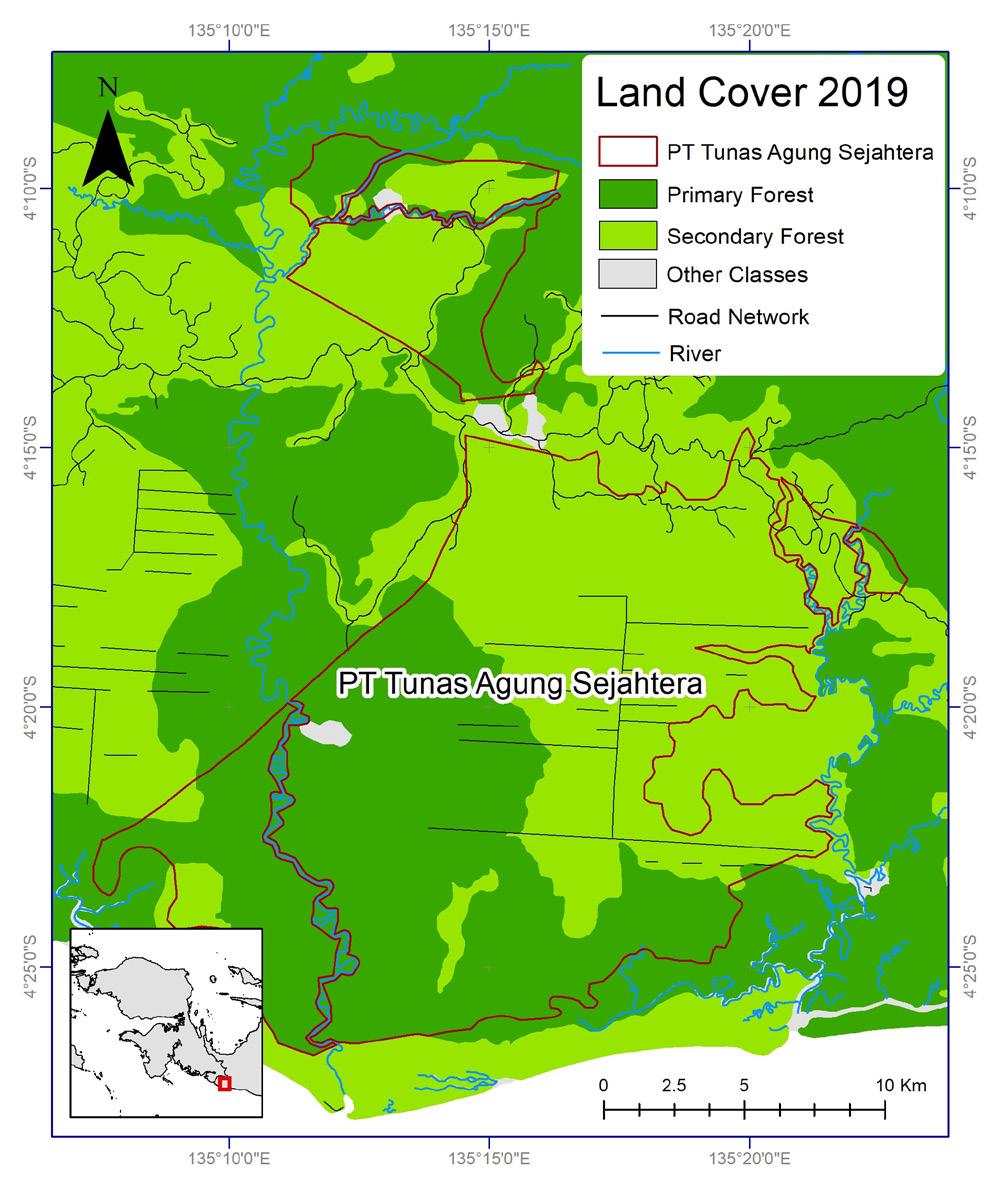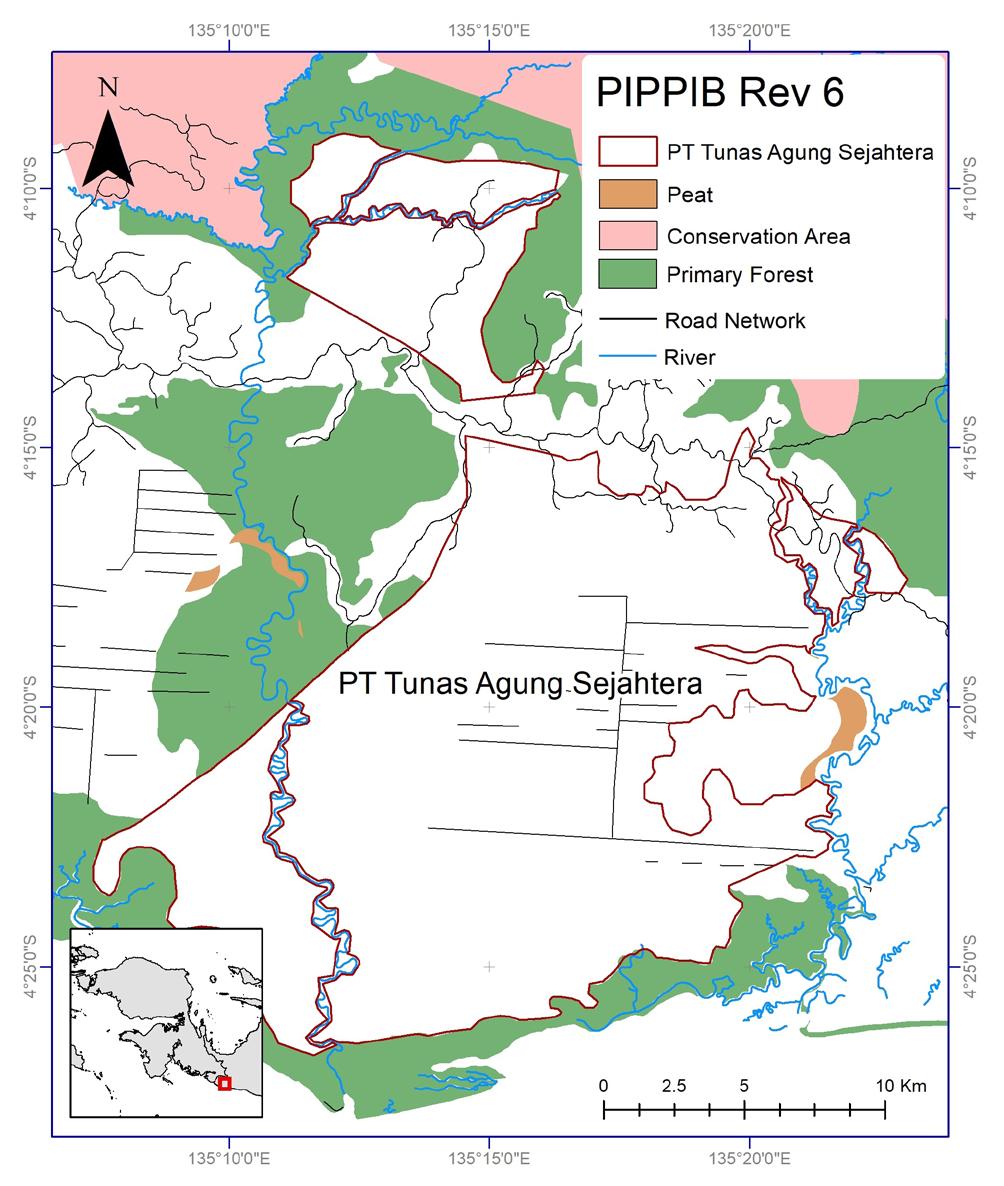
8 minute read
Case Study 8: Mimika, Salim Group/PT Tunas Agung Sejahtera
Issues of potential concern:
• Changes to Forest Moratorium • Abandoned concessions • Permit speculation • Use of HGU for land-banking • Concealed beneficial ownership
An aerial photo shows a primary swamp forest at concession PT Tunas Agung Sejahtera of Salim Group, in Umar Village, West Mimika subdistrict, Mimika district, Papua province. 18 Dec, 2017. © Ulet Ifansasti / Greenpeace
PT Tunas Agung Sejahtera (PT TAS) holds a 39,500 ha plantation concession in a very remote part of the south coast of Papua Province, in Mimika Regency. 2019 national land cover maps show that the concession is entirely forested, including large areas of primary forest (part of the area was formerly included in a logging concession, but this has regrown, and while old logging roads remain and the area is accessible by sea and river, it is 200 km from the nearest town). Much of the concession is classed on national land cover maps as lowland swamp forest bordering an area of mangroves. This was confirmed by Greenpeace aerial photography taken in 2017 which reveals the presence both of dense rainforest and of forested wetlands dominated by sago palms. It is undoubtedly a very ecologically rich landscape.
PT TAS was issued its location permit in June 2013, despite much of its concession being covered by the Forest Moratorium. Correspondence tables published by the Ministry of Forestry408 show that five months later, in November 2013, the company’s director wrote to the ministry claiming that, on the basis of surveys and interpretation of satellite images from 2012, all the forest in the concession was secondary. The ministry accepted this claim, and removed the previously included forest areas from the Forest Moratorium map. An area of 79 ha of peatland within the concession was also removed from the moratorium map at the same time, meaning that the concession was now entirely outside the moratorium. However, no changes have been made to the ministry’s own annually updated land cover maps, which have continued to show large areas of primary forest in the concession every year since.




Map of PT Tunas Agung Sejahtera showing revisions 5 and 6 of the moratorium map.
On 29 September 2014, PT TAS’s concession became one of those released from the forest estate by Zulkifli Hasan on his last day as a minister. Like most of the other concessions to which he issued forest release decrees at the time, it did not have an environmental permit or an IUP at this point, meaning that the release broke ministry regulations.409 PT TAS was to obtain these two key permits only on 30 December 2014 and 10 September 2015, respectively.
PT TAS changed ownership several times during the permitting process, suggesting that it may have been established for the purpose of permit speculation. It was established in 2007, and until 2013 was owned by companies which were in turn owned by an individual named Budi Yasa and his family. Then in August 2013 a majority share in PT TAS was transferred to a company registered in the British Virgin Islands, Ichiko Eastspring Ltd. The British Virgin Islands are a secrecy jurisdiction, so there is no way of knowing the beneficial ownership of this company, but since several new directors and commissioners were appointed at this time, it appears likely that new owners unrelated to the Yasa family were preparing to take over the company, perhaps subject to the fulfilment of certain conditions.
On 26 June 2016, however, plans appeared to have changed, as the new directors left the board and the shares in PT TAS reverted to a Yasa family company, PT Pusaka Agro Sejahtera. On the same day PT Pusaka Agro Sejahtera also resumed the ownership of PT Permata Nusa Mandiri (PT PNM), another plantation company, with a concession in Jayapura Regency, which had previously been owned by the Yasa family before passing to another British Virgin Islands holding company whose beneficial ownership cannot be determined, Farmiana Investment Ltd. It would appear that if a conditional sale of the two companies had been planned, it had fallen through.
However, the Yasa family still held a valuable asset, and in early 2017 a new buyer appeared. PT TAS was sold to PT Bumi Surya Kencana (PT BSK), a company which has proven management overlap with the Salim Group,410 one of Indonesia’s largest business empires. PT BSK is believed to be a ‘shadow company’ – a company whose beneficial ownership is concealed through nominee shareholders or offshore holding companies, thereby preventing it from being recognised as part of a wider group. (In the same year PT PNM was also sold to what appears to be another shadow company linked to the Salim Group.)
409 The forest release regulation in force at the time was signed by Zulkifli Hasan himself on 16 May 2014; see Minister for Forestry (2014). 410 One specific example of management overlap is that F.X. Purwanto – the director of PT Menara Wasior, another subsidiary of PT Bumi Surya Kencana – was in 2017 also director of a company majority-owned by Anthony Salim, PT Duta Rendra Mulya. More general evidence linking the Indogunta Group to the Salim Group is discussed in Greenpeace (2017, 2018a).
In this way the Salim Group apparently managed to acquire, in the shape of PT TAS, a concession including 17,619 ha of primary forest that should have been covered by the Forest Moratorium, and whose forest release had violated the ministry’s own regulations. If allegations of corruption were ever to be made in the future, the Salim Group would be able to claim to have had no knowledge of any transactions prior to its presumed purchase of the company.
The acquisition of PT TAS and PT PNM appears to be part of a wider process by which the Salim Group has expanded its landholdings in West Papua through purchases of companies with existing permits. As well as PT TAS and PT PNM in Papua Province, the group has bought another four companies from suspected permit speculators in Papua Barat Province within the last decade. Three of these have a history of similar irregularities to PT TAS, having either received forest release in breach of ministry rules411 or had peatland removed from the Forest Moratorium despite the demonstrable presence of peat.412
Over three years after its IUP was issued, PT TAS obtained HGU on 26 July 2018, despite the fact that the Oil Palm Moratorium, which was to require a review of existing oil palm permits (which could potentially have shown that there was no valid basis for issuing HGU), was on the point of being signed by the president. In fact HGU was issued to the Salim Group’s other concession company in Papua Province, PT PNM, on 15 November 2018, after the Oil Palm Moratorium had come into force.
Did the issuing of HGU to PT PNM break the terms of the Oil Palm Moratorium? Unlike in its instructions to regencies and provinces concerning the issuing of IUPs and to the MoEF concerning forest release, the moratorium does not require the National Land Agency to stop issuing HGU immediately. HGU data is supposed to be included in the permit review, however, and the agency is instructed to pass this data on to a cross-ministry evaluation team led by the Coordinating Minister for Economic Affairs to be considered alongside other permits and approvals. Only after receiving feedback from that team is the National Land Agency instructed to stop the process of issuing HGU in cases where the permitting process that is the precondition for HGU had already breached regulations (this presumably would include any problems with earlier permits, forest release or land acquisition from customary owners). Based on this feedback the agency is also instructed to decide which concessions should be declared abandoned and to cancel HGU for those concessions if they had previously been part of the forest estate. It would therefore have been more appropriate for the National Land Agency to have waited for the outcome of the permit review process before issuing new HGU certificates, especially to a company that had apparently been inactive since obtaining an IUP and forest release four years previously.
411 PT Bintuni Agro Prima Perkasa, which did not have valid location permits and IUPs at the time of forest release, and PT Menara Wasior, which exceeded the 20,000 ha limit for each tranche of forest release imposed by the regulations in force at the time (2017). 412 This was the case in PT Rimbun Sawit Papua’s concession in Fakfak Regency.
A pair of Victoria Crowned Pigeons (Goura victoria) in an area of forest near to PT Permata Nusa Mandiri’s oil palm plantation, Jayapura Regency. 10 Jul 2011.

A similar argument can be made in the case of PT TAS, even though in that instance HGU was issued shortly before the Oil Palm Moratorium came into force. The permit review mandated by the moratorium would likely have found irregularities in PT TAS’s permitting process (such as the breach of forest release regulations highlighted above) or else concluded that it should be considered abandoned, given that it had seen no activity since it had received its IUP three years previously. Instead, because PT TAS was issued HGU just as the moratorium was being finalised, it has consolidated its right to the land, as a result of which it would be more complicated for the government to revoke the company’s permits as part of the permit review mandated in the moratorium. For example, existing regulations concerning abandoned land require three years to pass from the time HGU was issued before action can be taken.413 The issuing of HGU has effectively legitimised the violations of regulations and pseudo-legal circumstances that characterised the earlier stages in its permitting process.
© Bernard van Elegem
413 Under the 2014 Plantation Law, HGU can be revoked if there has been no development in a concession for three years. Government Regulation 11/2010 on abandoned land (President of the Republic of Indonesia (2010a)) makes it clear that this period starts when the HGU is issued. Therefore, as there has been no activity in the concession to date, HGU could presumably be revoked without compensation in July 2021. If provisions in the new Omnibus Law are implemented, this period will be reduced to two years.







